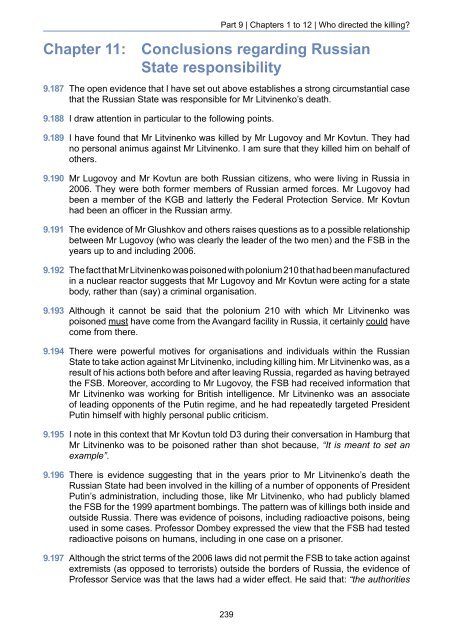The Litvinenko Inquiry
JIEp7Zyr
JIEp7Zyr
Create successful ePaper yourself
Turn your PDF publications into a flip-book with our unique Google optimized e-Paper software.
Part 9 | Chapters 1 to 12 | Who directed the killing?<br />
Chapter 11: Conclusions regarding Russian<br />
State responsibility<br />
9.187 <strong>The</strong> open evidence that I have set out above establishes a strong circumstantial case<br />
that the Russian State was responsible for Mr <strong>Litvinenko</strong>’s death.<br />
9.188 I draw attention in particular to the following points.<br />
9.189 I have found that Mr <strong>Litvinenko</strong> was killed by Mr Lugovoy and Mr Kovtun. <strong>The</strong>y had<br />
no personal animus against Mr <strong>Litvinenko</strong>. I am sure that they killed him on behalf of<br />
others.<br />
9.190 Mr Lugovoy and Mr Kovtun are both Russian citizens, who were living in Russia in<br />
2006. <strong>The</strong>y were both former members of Russian armed forces. Mr Lugovoy had<br />
been a member of the KGB and latterly the Federal Protection Service. Mr Kovtun<br />
had been an officer in the Russian army.<br />
9.191 <strong>The</strong> evidence of Mr Glushkov and others raises questions as to a possible relationship<br />
between Mr Lugovoy (who was clearly the leader of the two men) and the FSB in the<br />
years up to and including 2006.<br />
9.192 <strong>The</strong> fact that Mr <strong>Litvinenko</strong> was poisoned with polonium 210 that had been manufactured<br />
in a nuclear reactor suggests that Mr Lugovoy and Mr Kovtun were acting for a state<br />
body, rather than (say) a criminal organisation.<br />
9.193 Although it cannot be said that the polonium 210 with which Mr <strong>Litvinenko</strong> was<br />
poisoned must have come from the Avangard facility in Russia, it certainly could have<br />
come from there.<br />
9.194 <strong>The</strong>re were powerful motives for organisations and individuals within the Russian<br />
State to take action against Mr <strong>Litvinenko</strong>, including killing him. Mr <strong>Litvinenko</strong> was, as a<br />
result of his actions both before and after leaving Russia, regarded as having betrayed<br />
the FSB. Moreover, according to Mr Lugovoy, the FSB had received information that<br />
Mr <strong>Litvinenko</strong> was working for British intelligence. Mr <strong>Litvinenko</strong> was an associate<br />
of leading opponents of the Putin regime, and he had repeatedly targeted President<br />
Putin himself with highly personal public criticism.<br />
9.195 I note in this context that Mr Kovtun told D3 during their conversation in Hamburg that<br />
Mr <strong>Litvinenko</strong> was to be poisoned rather than shot because, “It is meant to set an<br />
example”.<br />
9.196 <strong>The</strong>re is evidence suggesting that in the years prior to Mr <strong>Litvinenko</strong>’s death the<br />
Russian State had been involved in the killing of a number of opponents of President<br />
Putin’s administration, including those, like Mr <strong>Litvinenko</strong>, who had publicly blamed<br />
the FSB for the 1999 apartment bombings. <strong>The</strong> pattern was of killings both inside and<br />
outside Russia. <strong>The</strong>re was evidence of poisons, including radioactive poisons, being<br />
used in some cases. Professor Dombey expressed the view that the FSB had tested<br />
radioactive poisons on humans, including in one case on a prisoner.<br />
9.197 Although the strict terms of the 2006 laws did not permit the FSB to take action against<br />
extremists (as opposed to terrorists) outside the borders of Russia, the evidence of<br />
Professor Service was that the laws had a wider effect. He said that: “the authorities<br />
239


